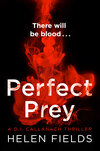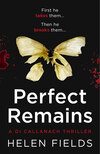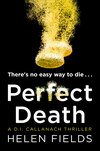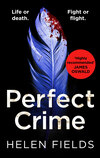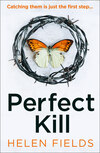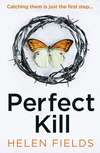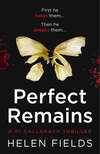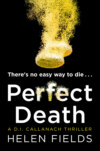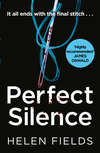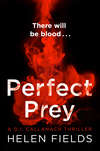Kitabı oku: «A DI Callanach Thriller», sayfa 6
Chapter Twelve
By the time Callanach and Salter reached the McDonald Road library to the north of Edinburgh city centre, Ailsa was outside waiting for them, eyes on her watch.
‘I wasn’t sure you’d be at work today,’ she said, greeting Callanach with a pat on the shoulder. ‘Is it sore?’
‘Haven’t noticed it,’ Callanach lied, looking up over the building’s exterior.
‘I do like a bit of creative stoicism,’ Ailsa smiled. ‘I’ll be down in the cellar seeing what sort of shape the crime scene is in. Meet me down there, and don’t be too long about it. My clients may not be able to complain, but I still don’t appreciate keeping them waiting.’
The library was a stunning old three-storey construction, with a round turret on the corner. ‘None of the windows were broken and no locks were forced. The ground level doors were alarmed. So how did the killer get in?’ Callanach asked Salter.
‘Maybe they hid,’ Salter said. ‘Waited until everyone else was out and then reappeared.’
They walked past the police officers still protecting the crime scene, ducked the crime scene tape, and entered. Callanach studied the layout with fresh eyes. Beyond the front door was a foyer with a staircase to the right leading up to community rooms. The door past the stairs led into a large studio area. Straight ahead was the central section of the library. Extraordinarily light, with architectural glass ceilings and tables for reading and working, the main body of the library had notices that proclaimed the watchful eyes of its CCTV system. Callanach called over one of the CSIs working onsite.
‘What’s the last you found of Michael Swan on the CCTV?’ Callanach asked.
‘I can show you,’ she said, opening up a laptop. A fuzzy black and white picture came into view. ‘This is the victim here. He leaves the central library room from the staff area and walks towards the front doors. We’re assuming that was him intending to leave for the night.’
‘Run it back a bit,’ Callanach said. The footage reversed for a couple of seconds at high speed and Callanach hit the space bar to stop it. ‘Play it from here.’
Michael Swan could be seen from the camera at the rear of the main room walking towards the staff area at the right-hand side of frame. He paused once, turned his head. Walked out of frame, then came straight back, walking out towards the main doors. The latter part was the shot they’d watched initially.
‘He’s not carrying anything,’ Salter said.
‘Actually, if you look carefully you’ll see he has his keys in his hand when he walks back across. That’s what makes it obvious that he’s about to leave,’ the CSI said, sighing as she spoke.
‘How often do you leave work after a whole day with nothing in your hands?’ Salter responded.
‘It’s summer,’ the technician replied, brushing hair out of her eyes and adopting a tone of voice midway between stroppy and defensive. ‘He hardly needs a coat. I don’t see how this is evidentially important.’
Salter clearly had more to say. She looked at Callanach before continuing. It wasn’t like her to get involved in an argument, but he could see she wasn’t done yet.
‘Have you had another member of the library staff show you Mr Swan’s personal effects?’ Salter asked, ignoring the challenge and following her own line of thought.
‘Of course. There’s the usual work paraphernalia, mugs, pens, notes, a book he was in the middle of reading. Some other random personal correspondence. We’ve followed procedure. Everything’s been bagged and tagged.’
‘Could we see it, please?’ Salter asked. The tech called a uniformed officer over, who promptly disappeared then returned with a large clear plastic bag containing several other smaller plastic bags, each containing a single item. Every bag had a label with a unique reference number, time, date and location on it. Callanach and Salter looked through each one.
‘Here,’ Salter said, holding up one particular bag with a thick piece of card, bearing gold leaf edging and italic printing. Michael Swan’s name was written in pride of place. Salter read it out. ‘“You are hereby invited to attend Edinburgh City’s Community Achievement Awards.” This was being held the morning after his death. And it says very clearly that the invitation must be produced at the door for entry.’
The tech officer had stopped looking stroppy and was fiddling with her laptop instead.
‘So he forgot it,’ she snapped.
‘I don’t think so,’ Salter addressed Callanach directly. ‘His wife told us he’d been looking forward to that. It would have been on his mind all day. I don’t believe he was ready to leave when he went towards the door.’
Salter rewound the CCTV footage again and hit play.
‘You see here, sir,’ she said, pointing at Michael Swan’s face as he turned mid-walk. ‘He hears something or is distracted by something. We know then he picks up his keys and goes towards the front door. I reckon he opened the door for someone else to come in. Not for him to get out. That’s why he hadn’t picked up the invitation yet.’
Callanach watched the footage one more time, then looked back at Salter.
‘Remind me again why you missed the last round of sergeant exams, DC Salter,’ he said.
‘I was on honeymoon, sir,’ Salter said.
‘Make sure you’re available to take them next time. That’s an order,’ Callanach said.
‘I might be too busy in six months’ time,’ Salter said. ‘I could get talent-spotted by a Hollywood agency or appear on Masterchef and end up opening my own restaurant.’
‘I doubt that,’ Callanach said. ‘I’ve tasted your toasted sandwiches. Seriously. You’d have passed the exams at the last sitting. Don’t let it wait.’
‘Detective Inspector,’ Ailsa Lambert shouted from the doorway. ‘You only have me for another few minutes. There are reports of an incident across the city. My team will hold the scene for me briefly, but it’s now or never. I’ve a full day ahead.’
They walked down into the basement, hastily donning white crime scene overalls, shoe covers and gloves. The scene was entirely different to the snapshot Callanach had of it from when he’d fallen. The area was now lit from all angles. Michael Swan’s body had, of course, been taken down but he was still suspended there in Callanach’s mind.
‘Two questions,’Callanach said. ‘How did the killer get Mr Swan to come down here, and how did they get him into position hanging from the overhead metal beams?’
‘If he let the killer into the building voluntarily,’ Salter said, ‘it must either have been someone he recognised or someone who seemed non-threatening.’
‘Okay, assuming either case, once in the building they persuaded him to open the basement and come inside.’
‘Easy enough if they were armed,’ Ailsa noted, pulling a thick wad of A4 photos from a folder. ‘Showing a knife or a gun would have the desired effect. Getting the man seven feet into the air makes less sense. The killer would have had to put down their weapon. No way of tying these knots without two hands.’ Ailsa paused to point out close-ups of the knots. Both were tied in the same way, one binding the hands, one binding the ankles, then another rope had been passed through the ankle knot, through the hand knot and looped around his neck.
‘What damage did the rope around his neck do?’ Callanach asked.
‘Very little in real terms, and it certainly wasn’t strangulation that killed him. The rope would have been useful to keep him still whilst his face was skinned. Of course, he’d have been on his back whilst that was being done. Other than that, once he was hoisted up to the ceiling, it simply held his head in place until he was found. There’s virtually no internal damage to the neck or throat area, only external bruising and chafing of the skin.’
Callanach moved to stand in the area where he’d fallen, directly below the space that Michael Swan’s face had filled.
‘So he stood still whilst his hands and feet were tied. The killer at that point holding no weapon. Mr Swan is then restrained by the additional rope fed from ankles to neck, and is laid on his back and skinned whilst still conscious.’
‘No drugs in his system, no blow to the head. I’m as sure as I can be that he was conscious when it started. I would guess he blacked out from shock and pain at some point, but he might well have come round again prior to blood loss stopping his heart and starving his brain of oxygen.’
‘So he must have been hoisted up,’ Callanach said.
Ailsa handed him a different photograph. This one showed Michael Swan in his final position, tied to the metal structural supports that ran across the ceiling, and facing down towards the floor. Somehow the photographer had managed to get high enough to capture the scene from parallel with the body. The image was ghoulish and dizzying.
‘So the end of the rope that ran the length of his body was then slung over the metal beams that ran perpendicular to the corpse, formed a final loop by passing back through the ankle knot to get his legs off the floor, and tied off at ground level at the base of the bookshelf.’ Callanach pointed to an old metal bookstand that must have weighed tons given the amount of paper on it. ‘Easily enough ballast to have stopped his body from crashing down. How much did Michael Swan weigh, Ailsa?’ Callanach asked.
‘A fraction under eleven stone. He was fairly slim so that would’ve helped. Still a lot of weight to lift that high though,’ she said.
‘Not necessarily,’ Callanach mused. ‘If the killer attached a weight to the free end of the rope it would have worked like a pulley system, the hanging weight hoisting the body up using gravity and thereby reducing the amount of pulling force required to lift him. Any reasonably fit adult would have been able to haul him up. It’s clever.’
Ailsa pulled her mobile out and tutted.
‘I’ve got to go. All I would add is that Mr Swan was pulled up there immediately upon the cut to the facial skin being completed. His legs were slightly higher than his head, helping the continued bleed from the facial wound. That’s why there was so much blood on the floor directly below the face. Keep that copy of the photos for reference.’ She handed them over as her phone beeped repeatedly. Ailsa swiped at the screen. ‘God knows what’s going on, I’ve got a hundred messages a minute coming into my phone.’
‘Thanks Ailsa,’ Callanach muttered, staring hard at the photos of Michael Swan’s face. The pathologist was nearly at the door when Callanach called back to her. ‘Ailsa! Is it possible that the killer cut round the edge of his facial skin, then hoisted him up to the ceiling, climbed on a chair or desk then pulled the skin flap down when he was already suspended?’
Ailsa stood still a moment. ‘Entirely possible,’ she said eventually. ‘It would explain the relative lack of blood on his clothes and the rest of his body. Unfortunately it also probably means that he was conscious after the cut and before being hauled up there. He might well not have passed out by that stage.’
‘Meaning Mr Swan might have watched his own blood pouring onto the floor, suspended there, waiting for death?’ Salter asked.
‘Whoever committed this crime is evil, and that’s not a word I use lightly. I think you should assume the very worst. If nothing else, it will give you more incentive than ever to catch the perpetrator,’ Ailsa said.
‘I think that image is rather more incentive than I need to do my job properly,’ Salter said as Ailsa left quietly.
Chapter Thirteen
Callanach’s phone buzzed, displaying a number he didn’t recognise. Sending the call to voicemail, he walked slowly around the basement, getting a feel for how the killer and Michael Swan would have moved around and how complex it would have been to set up such an elaborate tableau. That was how it felt. As if the killer had been creating something akin to an art installation. Of the sickest mind and most foul imagination, but an installation it was. And about as far from an impulsive killing as it was possible to get.
Even with the bright crime scene investigation lighting it was hard to see clearly beneath the book shelves, between the stacked boxes and unused piled-up furniture at the sides of the room. Callanach set his mobile to torch and flashed it down at floor level as he crawled stiffly along, wincing at the pain in his lower back. It was always possible that the scalpel had been dropped and not yet spotted or that some tiny object had spilled out of the killer’s pocket whilst taking out gloves or a knife. The basement was a galaxy of DNA, passed across from chairs once sat in, books borrowed, shoes that had traipsed in and out over more than a century. The chances of the forensic team being able to isolate any evidence relating to the killer’s identity were lottery-worthy, which might well have been part of the attraction of the kill-site.
Salter looked washed out. The edge of her hairline was visibly damp and she was half covering her mouth with one hand. None of them were immune to the shock of such barbarity, no matter how long they’d been on the job.
Callanach stood up, suddenly feeling ridiculous for thinking he could magic evidence out of thin air. He took another look at Salter who didn’t seem to be recovering and pointed towards an old chair pushed against the wall.
‘Take a seat for a minute,’ he said. ‘Begbie’s out for the foreseeable future and I’m injured. I’m not prepared to take any more risks with my squad members.’ Salter plodded towards the chair, breathing hard. Callanach knew the sound of someone trying not to throw up when he heard it. His phone began buzzing in his pocket again.
‘Sir,’ Salter said.
‘Unrecognised caller again. Who the hell got hold of my mobile number? Those idiots on switchboard need—’
‘Sir!’ Salter repeated, pointing towards the wall.
Callanach looked up. His DC was pointing at an old corkboard that had been leaned against it. It contained ageing posters about library fun days, an advert for a meet the author event, some personal notices – people selling, buying, offering services – and, near the top, a photo. Nothing dramatic, just a woman walking towards the car in her driveway. Callanach disconnected the phone call and stepped closer to the photograph to pick out the detail. He sighed as he realised he recognised the tan-coloured bungalow with the wrought-iron front gate, and the woman in her sixties, face slightly obscured as her grey hair flew sideways in the breeze.
‘Michael Swan’s widow,’ Salter whispered.
‘Taken when she had no idea she was being watched. The killer knew the address, knew who his wife was, who knows what else,’ Callanach said. ‘Pinned there as a reminder to the victim throughout his ordeal. I guess it’s not hard to imagine why he didn’t fight.’
‘He had children and grandchildren,’ Salter said. ‘The killer would have known that too, if they’d done any research. How could anyone do that? Not just kill, but literally deface a man.’
‘Mrs Swan had no idea she was being watched,’ Callanach repeated, peering closer at the photograph. ‘That’s what makes it so scary. The killer could have been there hours, or watching for days. Get it logged as evidence, then have a copy taken. I need you to go directly to Mrs Swan’s house. If she can tell us when it was taken, maybe we can understand how long this was going on.’ Salter’s phone rang. She answered the call and walked a few steps away to talk, as Callanach proceeded to the exit to strip off his suit.
As soon as his feet hit the pavement, Callanach’s mobile began to ring too.
‘Yes,’ Callanach snapped.
‘This is Lance Proudfoot, we spoke before. I’m from the online news blogging site?’
‘I thought we’d concluded our conversation, Mr Proudfoot. I’m busy, so …’
‘Do you have a comment about the latest body, Detective Inspector? We’ve got the photos already, so if you could just give me a line or two about how Police Scotland plans to investigate, or what reassurance you can give the public?’
‘How the hell did you get photos of Michael Swan’s body?’ Callanach snarled. ‘You release those and I’ll have you in a cell before you can reach your door.’
‘Not Michael Swan. The young woman in the dumpster. The photos of her were emailed to me embedded in a downloadable file this morning. Me and the rest of the popular press, unfortunately. It’s not exactly an exclusive. Did you not know? A huge part of the city has been closed off. The police are everywhere.’
‘Salter, what have you got?’ Callanach shouted over to her.
‘Caucasian female murder victim, early twenties, probable strangulation. Body left in a large bin. Must be what the pathologist was called to, sir,’ Salter responded, putting her own hand over her mobile mid-conversation to answer. ‘DI Turner is at the scene and heading it up. They want us back at the station. Superintendent’s called her own briefing.’
‘Right Mr Proudfoot, no comment, but I’m sending officers over to your offices to inspect your computer. I want those files. Back up what you need. You’ve got about ten minutes,’ Callanach said.
‘Oh, for heaven’s sake. At least give me something I can print before you destroy everything,’ Lance moaned.
‘Police Scotland have no comment at the present time,’ Callanach said. ‘Print that.’ He hung up and shouted enough details to enable uniformed officers to find Lance Proudfoot and seize his hard drive. ‘Get the car, Salter. We’ll stop at the scene on the way back to the station.’
Twenty minutes later they arrived as close as they could get to Valleyfield Street. The crime scene boundary extended well beyond the two entrances of the road. Leven Street and Glengyle Terrace were both sealed off, and across Leven Terrace, where a footpath led into The Meadows, a police cordon enclosed a huge section of parkland.
Salter disappeared in search of other members of the squad. Callanach made directly for Ava who was deep in conversation with Ailsa Lambert, under the shelter of a temporary white awning designed to keep out prying eyes. Not that it would make much difference now, if photos really had been leaked to the press.
Ava saw him approach and beckoned him in. Within the confines of the tent was a blue dumpster. Callanach was handed a crime scene suit with accessories. He really shouldn’t have bothered taking the last ones off, he thought.
‘Cause of death?’ he asked Ailsa as he brushed past her to get a better look.
‘Barring us finding something more at autopsy, almost certainly strangulation,’ Ailsa said.
‘I need more officers down here, Luc,’ Ava said. ‘Can you tell the superintendent when you get back to the station? And the overtime restrictions will have to be lifted. This’ll take more man-hours than they’re paying for.’
There was a screech from the end of Valleyfield Street, a loud scuffling of feet, then a man could be heard shouting. Callanach drew his gaze away from the twenty-something young woman lying in the dumpster, the lower half of her body still concealed in a rough sack, as Ava stepped out of the tent and took control.
‘Stop right there,’ she ordered. ‘Officers, get control of those people.’
A woman barged through, frantic, wailing. Ava tried to grab her but momentum made her unstoppable. She pushed Ailsa aside and launched herself towards the dumpster, hands gripping the edge, peering inside. All the noise she’d been making instantly ceased. She sank to the floor. A second later and a man appeared behind her. He took one look at her face and stumbled, his knees hitting the pavement hard, falling into the woman’s side. They stayed there like that, rocking and shaking, until Ava sat down beside them.
‘Can you tell me who she is?’ Ava asked.
The woman tried to speak. Her mouth worked itself open and shut but nothing came from it. Uniformed officers appeared, Ava looking at them in a way that made it clear they should never expect promotion after letting members of the public burst onto a crime scene.
‘Move these people to somewhere private and secure. Look after them. Make sure they have access to medical assistance if required and ascertain their relationship to the deceased, please,’ Ava said. The uniformed officers wrapped blankets around the shoulders of the two obviously grieving people, and persuaded them gently towards a vehicle.
Ava pinched the bridge of her nose between finger and thumb, grinding her teeth.
‘Can we not get a frigging break? Bodies are piling up and we seem to be the last to find out what’s happening,’ she muttered. ‘How in God’s name did they know where to find us?’
Callanach pulled out his phone and internet searched the terms ‘body’, ‘Edinburgh’, and ‘breaking news’. It took just seconds. Various pages popped up with the story. As yet, not one news agency had been stupid enough to risk prosecution by posting the shared photos of the dead girl, but there was a clear description of both the girl and the crime scene, right down to the details of what she’d been wearing.
‘A young woman has been found dead in a Valleyfield Street dumpster,’ the first article began. ‘She is believed to be in her twenties, with long blonde hair and wearing a scouting uniform. Of particular note is the multicoloured, knitted scarf around her neck. Police have not yet issued a statement or confirmed her identity.’
‘Ma’am,’ a uniformed constable said, keeping his distance from Ava. ‘That’s Mr and Mrs Balcaskie. They’ve confirmed the deceased is their daughter, Emily. She’s twenty-four years of age and attended a scout meeting here last night in that building over the road. When she didn’t come home they assumed she’d decided to stay with friends in the city. It was the description of the scarf on the news reports that made them realise it was her.’
‘Thank you, Constable,’ Ava said. ‘I’ll be over to speak with them personally in a moment.’
Ailsa took photos as Ava and Callanach stared in at the corpse. The knitted scarf was wrapped several times around the girl’s neck, pulled so tight that the fibres were straining, the ends of it shoved hard into her mouth. Her eyes were bulging, the whites stained dark red from haemorrhaging.
‘What’s happening, Luc? Four murders in two weeks? It’s as if a pack of wild animals has been let loose in the city.’ Ava wiped a tear away, keeping her back carefully towards her squad. Callanach hadn’t known her long, as friendships went, but he never thought he’d see her emotional at a crime scene. She was a career police officer – a fiercely tough, professional one. He wanted to stretch a hand out, to give some comfort, but DCI Edgar’s words squirmed in his guts. Perhaps Ava did need some space, want to keep the boundaries of their friendship rigid and clear.
‘Sometimes these things all happen at once. There’s rarely an explanation,’ he said. ‘I’ll report to Overbeck for you. There’ll have to be a press conference soon and a lid needs to be put on media coverage. How did they get hold of photos of the body so quickly?’ he asked.
‘Didn’t you hear?’ Ava asked. ‘It was the press who reported the body. They alerted us. Even gave us the address. Someone wanted her found, and with as much media circus as they could rouse. Tell Overbeck I’ll call later to update her in person. And if you bump into Edgar, explain that I’ll be busy for the next twenty-four hours, would you?’
‘Sure,’ Callanach said, taking a step away, his mind made up about whether or not it was appropriate to offer support beyond the procedural or administrative. It was clear that DCI Edgar was already filling that gap. He left Ava making her way towards the couple who should never have faced the tragic indignity of hearing the news of their daughter’s death via the media, regrouped with Salter and headed back to the police station.
Callanach headed straight for Begbie’s office where Superintendent Overbeck had temporarily set up shop. She was on the phone when he entered, cooing a mixture of ‘yes sir’ and ‘no sir’ into the mouthpiece in a reassuringly soothing manner. Five minutes later, she put the phone down and looked up.
‘Sit down, Callanach. I’ve got gridlock across a square mile of the city, the press want to hang me out to dry and I’m being chased by a team of American fucking documentary makers who want to do a two-hour special on the murder craze sweeping out of control on Edinburgh’s streets.’
‘Ma’am, I’ve just—’
‘Don’t speak, Inspector,’ she said, taking out a mirror and lipstick. ‘Your current job is to accompany me and not to bollocks anything up. We are going down to give a press statement now. The ladies and gentlemen of the media are to be regarded as our friends – the sort you exchange Christmas cards with but are always too busy to actually see in person. We will appear obliging whilst giving them precisely nothing. We have an opportunity with these cases. We can solve them quickly, providing justice and relief to the families of the deceased, and come out of this acclaimed and heroic. Or they will continue to blight Scotland, in which case you and DI Turner can take an endless vacation in the back of beyond as I scapegoat you for incompetence. Either way, I will not be made the whipping girl for any monumentally shit-storming failure to protect the general public from the lunatic killers currently rampaging unchecked. Do you get it?’ She applied liberal lipstick, raising one appraising eyebrow in her mirror. ‘Good. Off we go then.’
The conference room was buzzing. It was hard to imagine how any more cameras, microphones or bodies could possibly have been shoe-horned in. Unlike past press conferences with the well-worn figure of DCI Begbie at the helm, when Overbeck stalked in with her high heels, perfect hair, and an attitude you could use to cut sheet metal, there was an immediate silence. Introductions and format announcement done, the superintendent began spinning.
‘I’m personally overseeing the Major Investigation Team in the absence of DCI Begbie, and I shall be relying heavily on Detective Inspector Turner and Detective Inspector Callanach to bring these cases to a swift and successful close. Rest assured that I will not allow my officers to sleep until these killers are behind bars. As you know, we now have four open murder cases and I will not tolerate anything but the highest of standards being applied. We owe that to the deceased and their families and loved ones, who are constantly in our thoughts. In the meantime, we appreciate your continuing support and may, at times, ask for your understanding and discretion. I’ve worked closely with many of you before,’ Overbeck managed a suitably sad-looking smile, ‘and I hope you know that where I can release information, I will.’
‘Superintendent, can you confirm the identity of the latest victim?’ the question was shouted across the sea of journalists’ heads.
‘Emily Balcaskie was found dead this morning. As you all know by now, her body was found in Valleyfield Street. She was a primary school teacher at Bonaly. Last night, in her capacity as a scout leader, she attended a meeting and failed to return home afterwards. We believe, although the investigation is in its most preliminary stages, that she was walking through The Meadows towards her car when she was approached. It seems likely that she was killed in the park and then her body was returned to Valleyfield Street.’
‘Are all four killings the work of one serial killer, Superintendent?’ a different voice yelled. Overbeck didn’t even blink, Callanach had to give her credit for that. Nor did she pause before answering in a silky smooth voice that wouldn’t have been amiss in a chocolate advert.
‘The methods used in the murders of Sim Thorburn, Helen Lott, Michael Swan and Emily Balcaskie have all been wildly varying, as have the places and times of death. We see no pattern between the four cases currently under investigation. Please do not disturb your readers with talk of serial killers. There are a number of possible explanations for these murders occurring so closely in time. As you know, drugs often play a part in violent murders and the variety of parties, celebrations and festivals throughout the city in the summer necessarily attracts some less wanted elements. We have yet to rule out whether or not any of the victims knew their attackers, as statistics tell us is the most likely scenario in cases of this sort.’
‘Why hasn’t Police Scotland released the details of how Michael Swan was killed yet?’ a man near the front asked. Callanach recognised him from an online search as Lance Proudfoot. He was balding, tall and sporting a T-shirt that proclaimed him an avid Rolling Stones fan.
‘We’re still liaising with Mr Swan’s family and there are some highly technical forensic issues. We hope to have a statement with you in the next forty-eight hours,’ Overbeck replied.
‘Was the police raid on a warehouse in Newington linked to the murders?’ a woman near the front asked. Callanach wondered how much more successful the investigation might be if all the journalists worked for the police instead of the media. They certainly knew more than he did about what was going on around the city at the moment.
‘Whilst I can’t give you any specific information about that, I can tell you that the raid you’re referring to was part of an ongoing investigation by a specialist team from Scotland Yard and nothing to do with any of the murders.’ That would be DCI Edgar’s hacker then, Callanach thought. That case didn’t seem to be progressing at any great pace either. He needed DCI Tripp back. Callanach would have to talk to Edgar about when that was likely to be possible. ‘And now I’m afraid I’m required elsewhere,’ Overbeck went on. ‘Any other questions should be directed through the media liaison office and you all have the crime-line numbers to encourage the public to come forward with information. Please do remember to add them to your releases. Many thanks for your patience and your efforts to assist us.’
